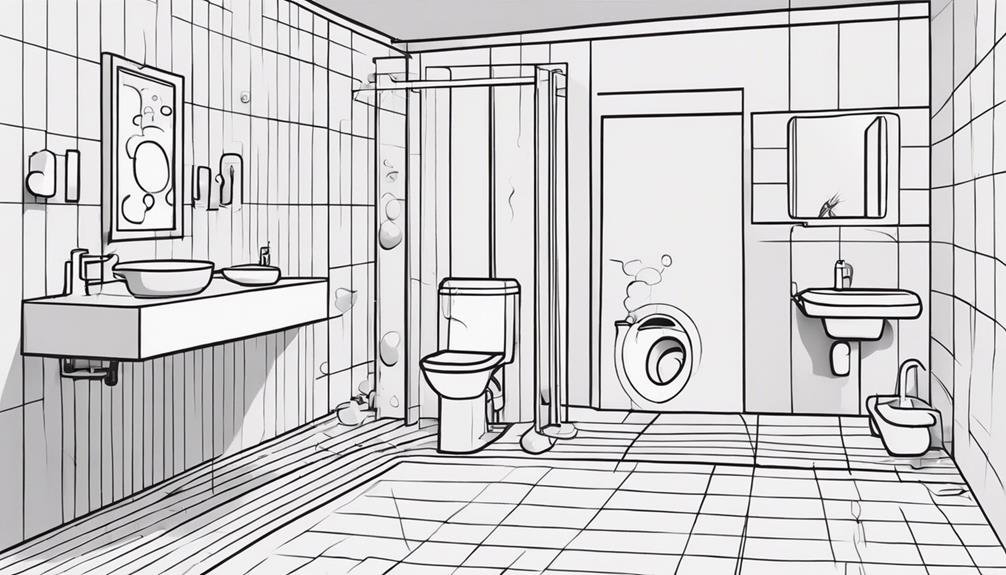If you've noticed a certain earthy scent lingering around your property, it might be worth investigating further.
However, foul odors are just the beginning when it comes to potential signs of septic tank issues.
Addressing this early can save you from more extensive problems down the line.
Key Takeaways
- Slow drains and odors near drain field indicate septic issues.
- Sewage backups and gurgling sounds signal septic tank failure.
- Lush green grass over field and skin irritations warn of problems.
- Groundwater contamination, nitrate pollution, and health risks demand immediate action.
Foul Odors

If you notice foul odors emanating from your septic tank, this could indicate a potential septic tank failure. Addressing odor control is crucial in maintaining a healthy septic system. One effective way to control odors is by regularly pumping your septic tank every 3-5 years, depending on usage. This prevents solids from building up and causing foul smells. Additionally, using septic-safe toilet paper and avoiding flushing non-biodegradable items can help maintain a balanced environment within your tank.
Maintenance tips are essential for odor control and overall septic system health. Inspecting your tank and drain field annually can help detect any issues early on. Ensure that the tank's lid is secure, and there are no visible signs of leakage. Proper waste disposal practices, such as avoiding pouring grease down the drain and being mindful of water usage, can also contribute to odor prevention.
Slow Draining
One common indicator of septic tank issues is sluggish drainage, which may suggest potential problems within the system. When you notice slow draining in sinks, showers, or toilets, it could be a sign that your septic tank needs attention. Addressing drainage problems promptly is crucial to prevent more severe issues from developing.
Key Points:
- Check for Clogs: Hair, grease, and other debris can accumulate in pipes, causing slow drainage. Consider using drain strainers to prevent clogs.
- Monitor Water Levels: High water levels in the tank can lead to slow drainage. Have a professional inspect and pump your tank regularly.
- Avoid Harsh Chemicals: Chemical drain cleaners can harm your septic system. Opt for natural alternatives like baking soda and vinegar.
- Inspect the Drain Field: Issues in the drain field can also cause slow drainage. Ensure the area is free from obstructions and roots.
- Practice Water Conservation: Excessive water usage can overload your septic system. Implement water-saving habits to prevent drainage problems.
Addressing slow draining promptly and following maintenance tips can help keep your septic system functioning properly.
Lush Grass

When a septic tank is failing, you might notice patches of unusually green and lush grass in your yard.
This can be a sign that the tank is overflowing or leaking, causing excess nutrients to fertilize the grass.
Keep an eye out for these vibrant patches as they could indicate a potential septic system issue that needs prompt attention.
Green Grass Patches
Green grass patches, also known as lush grass areas, surrounding your septic tank could indicate a potential issue with the system's drainage or leakage. When your septic system fails, it can lead to excessive water pooling underground, causing the grass above to thrive more than usual.
Here are some reasons why green grass patches near your septic tank might be a concern:
- Soil compaction due to water accumulation.
- Nutrient imbalance from leaking waste affecting grass growth.
- Increased moisture content promoting grass growth.
- Presence of excess nitrogen in the soil.
- Higher levels of phosphorus leading to greener grass.
If you notice these signs, it's essential to have your septic system inspected promptly to prevent further damage.
Unusual Plant Growth
Excessive lush grass growth around your septic tank often signals potential drainage or leakage issues within the system. When your septic tank is struggling, the excess nutrients can lead to a boost in plant growth, resulting in unusually green and healthy-looking grass patches.
However, this vibrant growth can be deceiving. The lush grass may be a sign of plant discoloration due to the absorption of excess moisture and nutrients from a leaking tank. Additionally, root invasion can occur as plants seek out the nutrients leaking from the septic system, further exacerbating the problem.
Keep an eye out for this unusual plant growth pattern as it could indicate underlying septic tank issues that require prompt attention to prevent further damage.
Sewage Backup
Experiencing foul odors lingering around your drains or noticing slow drainage in your sinks and toilets? These could be early signs of sewage backup, indicating potential issues with your septic tank.
Addressing these warning signs promptly can help prevent more severe problems and costly repairs down the line.
Foul Odors
Detecting foul odors emanating from your septic tank system can indicate a potential sewage backup, a sign of septic tank failure that requires immediate attention. When faced with such a situation, it's crucial to act promptly to prevent further issues. Here are some key points to consider:
- Check for any visible signs of sewage backup, such as wet areas around the tank or slow drains.
- Avoid using harsh chemicals that can disrupt the natural balance of the septic system.
- Schedule a professional inspection to assess the extent of the issue and determine the best course of action.
- Consider increasing the frequency of septic tank pumping to prevent future problems.
- Implement odor control measures, such as using bacterial additives or installing a ventilation system.
Slow Drainage
To address slow drainage, a common indicator of sewage backup in septic tank systems, it's crucial to promptly identify and resolve the underlying issues to prevent further complications.
Septic tank maintenance plays a vital role in preventing slow drainage and potential sewage backups. Regular inspections by professionals can detect early warning signs, such as slow drainage, allowing for timely interventions.
When faced with slow drainage, consider drainage solutions like using enzymatic cleaners to break down organic matter or employing hydro jetting to clear blockages. These proactive measures can help maintain the efficiency of your septic system and prevent more severe issues down the line.
Gurgling Sounds

If you hear gurgling sounds coming from your drains or pipes, it could be an indication of potential septic tank issues. Gurgling sounds aren't to be ignored, as they might signal underlying problems that require attention.
Here are some key points to consider:
- Check Your Plumbing Vents: Blocked or clogged plumbing vents can lead to gurgling sounds. Ensure they're clear of debris.
- Inspect Your Septic Tank: A full or malfunctioning septic tank can cause gurgling. Regular inspections are crucial.
- Avoid Harsh Chemicals: Chemical drain cleaners may worsen septic tank issues. Opt for natural solutions.
- Consider DIY Solutions: Simple fixes like checking for leaks or blockages can sometimes resolve gurgling sounds.
- Seek Professional Help: If gurgling persists or is accompanied by other signs of septic tank failure, it's best to consult a professional for thorough assessment and repairs.
Health Issues
Experiencing persistent health issues such as nausea, headaches, or skin irritations could be indicative of underlying septic tank problems that require immediate attention. When a septic tank malfunctions, harmful bacteria can contaminate the water supply, leading to health issues for you and your family. Preventive measures such as regular inspections and maintenance can help avoid these problems. Early detection of septic tank issues is crucial in preventing health complications. If you notice any unusual symptoms that persist, it's essential to have your septic system checked by a professional.
Nausea and headaches can result from inhaling toxic fumes produced by a failing septic tank. Skin irritations may occur due to exposure to contaminated water. These symptoms shouldn't be ignored, as they could worsen over time if the septic tank issue is left unresolved. By addressing septic tank problems promptly, you can safeguard your health and prevent potential long-term consequences. Remember, your well-being is paramount, so don't hesitate to take action when it comes to your septic system's health.
High Nitrate Levels

Persistent health issues like nausea, headaches, and skin irritations can sometimes be linked to septic tank problems, and high nitrate levels in the water supply can exacerbate these symptoms. High nitrate levels in your water can stem from septic tank issues, posing risks to both your health and the environment.
- Water Contamination: Septic tank failures can lead to the contamination of your water supply with nitrates, which are harmful if consumed in high concentrations.
- Health Risks: Elevated nitrate levels in the water can cause serious health issues, especially for infants and pregnant women.
- Groundwater Pollution: Nitrates from septic tanks can seep into the ground, polluting groundwater sources and affecting nearby wells.
- Environmental Impact: Excessive nitrate levels can harm aquatic ecosystems, leading to algae blooms and fish kills.
- Testing Importance: Regularly testing your water for nitrate levels is crucial to catch septic tank problems early and prevent health hazards.
Conclusion
In conclusion, recognizing the signs of septic tank failure is crucial for maintaining a healthy home environment. Did you know that according to the Environmental Protection Agency, failing septic systems can contaminate groundwater and pose serious health risks?
By staying vigilant for foul odors, slow draining, lush grass, sewage backup, gurgling sounds, health issues, and high nitrate levels, you can prevent costly repairs and protect your family's well-being.
Don't ignore the warning signs – take action to address septic tank issues promptly.

